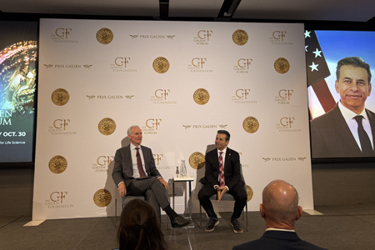Makary Talks Faster Drug Reviews, 'Continuous Trials,' DTC Ads

By Ben Comer, Chief Editor, Life Science Leader

The FDA must “cut the idle time” that exists within the agency to bring drugs to market faster, said Commissioner Martin Makary, M.D., during a wide-ranging conversation at the Galien Forum in New York City on October 30.
Asked about the FDA Commissioner's National Priority Voucher pilot program, as well as new draft guidance that removes comparative effectiveness study requirements for biosimilars, Makary emphasized the need to challenge established processes and timelines. “We cannot become numb and just accept this broken system that we've inherited now for 50 years at the FDA, that's had very little change,” he said.
Another pilot program called the Chemistry, Manufacturing, and Controls Development and Readiness Pilot Program, allows FDA “to do the CMC review and even the inspections before the clinical trial is complete,” said Makary. “I don't know if it's going to work, but we have to try new things.” Makary also noted that he has “asked Congress to renew” the Rare Pediatric Disease Priority Review Voucher program and is “optimistic that they will.”
Pilot programs are one way to potentially speed up FDA operations, but there are other ways to modernize and improve the agency’s processes, said Makary. Citing the FDA Roadmap to Reducing Animal Testing in Preclinical Safety Studies, Makary said computational modeling and organ on a chip technology has matured. “We may be blocking some potential cures for humans because the animal tests are not very predictive … if [a drug] fails animal test studies, it doesn't mean it's not going to have a therapeutic benefit in humans.”
Depending on the molecule type, animal testing can be very expensive, and can add six months or more to development timelines, said Makary. “We're going to make more announcements, I think in the next few weeks, on the specifics of which molecules will no longer have an animal testing requirement.”
‘Continuous Trials’
The FDA faces intense competition from other countries — mainly from China — to move faster, said Makary. “We can come up with some protectionist strategies, but ultimately, the root issue is that we have to be more competitive in how we intake applications, how we administer INDs, and how we review Phase One applications, and we may need to get to a continuous trial model.”
By way of analogy, Makary noted that students don’t apply for college after each year, producing a 500-page document detailing freshman year results in order to get accepted for a second year, and then doing that over and over again. “We can now with modern technology run more continuous trials with endpoints in the cloud, that the regulators look on to,” he said. “It's a longer-term project, but I think we're going to get there.”
Direct-To-Consumer Advertising
Asked about FDA’s DTC crackdown and any feedback received from the drug industry, Makary claimed that behind closed doors and off the record, a lot of pharmaceutical company CEOs told him that he should ban all DTC ads. “We're not going to ban them because there's a First Amendment, but we do have a regulation at the FDA that says you cannot create a misleading impression … when [actors] are continually dancing and singing, marching from some fake town to I don't know where they're going … you watch these things and you're like, ‘Okay, I give up. I'll take it! What was that side effect, did it say sudden death?’”
Makary asked the audience for a show of hands in favor of “dancing and singing” drug ads, and no hands were raised. He also noted that “doctors don’t like these direct-to-consumer ads … it distorts the doctor-patient relationship, something like 95% of doctors believe that.” Makary also said that “overtreatment” is a big part of the problem with healthcare in the U.S.
The FDA had become increasing lax in enforcing regulations that govern drug advertising, said Makary, a trend the agency aims to reverse. He pointed to the “1,500 Warning Letters sent to the industry, and 108 enforcement cease and desist letters” sent out in recent weeks. “I would love to see the 10% to 20% to 25% of the budget that some of these pharmaceutical companies are spending [on DTC ads] being diverted to lower drug prices for everyday Americans,” said Makary.
Commissioner Makary was interviewed by Marc Tessier-Lavigne, CEO at Xaira Therapeutics, during the Galien Forum. Part two of this article will cover Makary’s comments on AI, the Trump administration’s national health priorities, and the role of food in public health.
